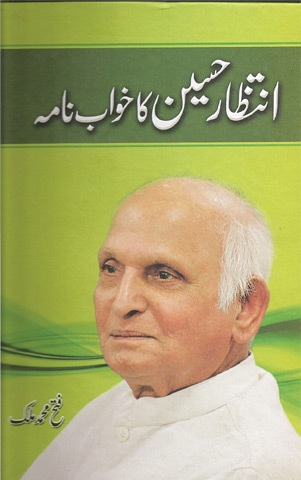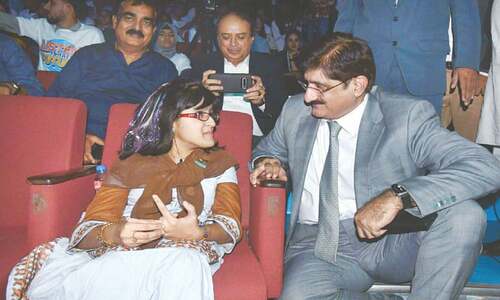
“INTIZAR Hussain used to view our present in the perspective of our past and future,” writes Prof Fateh Muhammad Malik in the foreword to his new book Intizar Hussain ka khwaab nama.
Once Intizar sahib, while elaborating his source of inspiration, said that “for me, a question is: is life more real for me or my dreams are? Perhaps my dreams [are more real]”. Quoting these words, Prof F. M. Malik says Intizar Hussain used to observe the world around him with his inner eye. But what is new and more important in this book is its author’s point of view that says that in Intizar sahib’s art and his works the most prominent element is the inheritance handed down to Intizar sahib form Iqbal’s legacy. This is to say that just like Iqbal, Intizar sahib dreamed of a national renaissance. He, says Prof Malik, acquainted himself with the other civilisations as well as ours and this resulted in an in-depth knowledge of the rise and fall of nations. This in turn gave Intizar Hussain a vision and a dream of our nation’s renaissance.
Intizar Hussain, one of Urdu’s most accomplished fiction writers of our times, died in Lahore on Feb 2, 2016. The book, a slim volume, is among the critical works appearing after his death, celebrating his cultural and literary genius. The book is divided into three sections: Intizar Hussain’s fiction, his philosophical and ideological leanings and his travelogues. In the first section, Prof Malik gives an overview of Urdu short story before independence and stresses that the so-called realism of the progressive writers was limited to either Romantic realism or, as he quotes from Ahmed Nadeem Qasmi, was an abstract kind of realism. The progressives, while disowning the past and traditions, ignored the fact that reality is not static or abstract but is rooted in the past. Also, realism does not stop a writer from dreaming. Blending dreams with reality creates a new style, just as one can see in Intizar Hussain’s works. In his search for our roots, says Prof Malik, Intizar Hussain reached the 1857 war of freedom, then Karbala and then even further back into history recalling the Battle of Badr. Intizar Hussain was in fact a force behind the trend in our fiction that ended, as put by Prof Malik, “the artificial realism”. In this section Malik sahib has successfully proved that Intizar Hussain’s fiction has its roots in our past and present, portraying the Pakistan Movement, migration in 1947, the fall of Dhaka and the anarchic situation in Karachi in his novels and short stories. It is a kind of dreamlike realism that has blended the reality with creativity and a touch of imagination, yet rooted in real world.
Here Prof Malik also expresses a disagreement with Safdar Mir who once had written that “Intizar Hussain was not interested or engaged with politics and whatever he wrote was not political”. Prof Malik thinks it is a fallacy and concludes that Intizar Hussain was much concerned with the future of this nation and his writings show that he was much committed to the nation and absorbed in the national and cultural identity. Though this fallacy, thinks Prof Malik, may have been a result of Intizar sahib’s own writings in which he tried to give a false impression that he was noncommittal and wrote that “commitment is a tree that has a bitter fruit”. Prof Malik thinks that Intizar Hussain was committed to Pakistan and “immediately after the creation of Pakistan he got himself busy with building a new paradise in Pakistan”.
In the second section he stresses that Intizar Hussain’s another commitment was with Lahore, where he settled after migrating to Pakistan. With all his creativity and sensitivity, Intizar Hussain wrote about Lahore’s history, its culture, streets, trees, birds and flowers in his newspaper columns, criticism and fiction.
As for Intizar Hussain’s travel accounts, Prof Malik thinks they remind one of the Sufis who are apparently busy with worldly tasks but their heart is immersed in the love and thought of the Creator. Similarly, Intizar Hussain’s travelogues apparently describe the external world but his mind is immersed in the cultural heritage of the Muslims and their history.
Prof Malik is well past 80 but is still active academically and writes columns, articles and books. His hallmark is patriotism, a love for Urdu and Allama Iqbal. His hypothesis that Urdu is Punjab’s mother tongue had created ripples that still keep on hitting the shores. A Pakistani to the core and lover of Iqbal and the Quid-i-Azam, Prof Malik is the figure to whom many look for guidance and understanding on certain literary and political issues.
Published by Lahore’s Sang-i-Meel Publications, it is a thought-provoking work that sheds new light on the art and works of Intizar Hussain. But if one wants to see how Pakistani publishers are discouraging serious readers and undermining reading habits, one must see this 120-page book, which is priced at Rs600. Simply prohibitive!
Published in Dawn, March 6th, 2017












































Dear visitor, the comments section is undergoing an overhaul and will return soon.